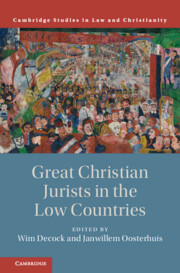Book contents
- Great Christian Jurists in the Low Countries
- Law and Christianity
- Great Christian Jurists in the Low Countries
- Copyright page
- Contents
- Contributors
- Introduction Law, Christianity, and Secularization in the Low Countries
- 1 Alger of Liège
- 2 Arnoldus Gheyloven
- 3 Boëtius Epo
- 4 Leonardus Lessius
- 5 Franciscus Zypaeus
- 6 Hugo Grotius
- 7 Paulus Voet
- 8 Ulrik Huber
- 9 Zeger-Bernard van Espen
- 10 Dionysius van der Keessel
- 11 Pieter Paulus
- 12 Guillaume Groen van Prinsterer
- 13 Edouard Ducpétiaux
- 14 Charles Périn
- 15 Léon de Lantsheere
- 16 Paul Scholten
- 17 Willem Duynstee
- 18 Jules Storme
- 19 Herman Dooyeweerd
- 20 Josse Mertens de Wilmars
- Index
- References
3 - Boëtius Epo
Published online by Cambridge University Press: 16 September 2021
- Great Christian Jurists in the Low Countries
- Law and Christianity
- Great Christian Jurists in the Low Countries
- Copyright page
- Contents
- Contributors
- Introduction Law, Christianity, and Secularization in the Low Countries
- 1 Alger of Liège
- 2 Arnoldus Gheyloven
- 3 Boëtius Epo
- 4 Leonardus Lessius
- 5 Franciscus Zypaeus
- 6 Hugo Grotius
- 7 Paulus Voet
- 8 Ulrik Huber
- 9 Zeger-Bernard van Espen
- 10 Dionysius van der Keessel
- 11 Pieter Paulus
- 12 Guillaume Groen van Prinsterer
- 13 Edouard Ducpétiaux
- 14 Charles Périn
- 15 Léon de Lantsheere
- 16 Paul Scholten
- 17 Willem Duynstee
- 18 Jules Storme
- 19 Herman Dooyeweerd
- 20 Josse Mertens de Wilmars
- Index
- References
Summary
Boëtius Epo is a jurist whose life reflects all areas of tension and all contrasts typical of the sixteenth century. Born in Friesland, in the Northern Netherlands, which were soon to struggle out of the grasp of the Spanish king, he was to find his ultimate destination in Douai, situated in the Southern Netherlands still under Spanish rule. In his young life attracted to the enticing approach of the awakening Reformation toward the primitive church, he nevertheless retraced his footsteps, recognizing the orthodox Catholicism in which he had been raised. More than that, he revealed himself as belonging to the considerably radical wing of the Counter-Reformation. In his scholarly attitude there was a certain ambiguity between, on the one hand, being inclined to adhere to a re–foundation (ressourcement) of the sources of canon law, especially the texts compiled in the Decretum Gratiani, and, on the other, still adhering to spurious texts, maybe because from an ideological viewpoint their content was dear to him.
- Type
- Chapter
- Information
- Great Christian Jurists in the Low Countries , pp. 52 - 63Publisher: Cambridge University PressPrint publication year: 2021

